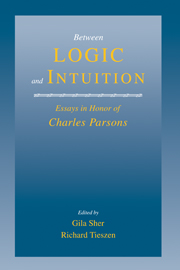Preface
Published online by Cambridge University Press: 02 December 2009
Summary
We offer this collection in honor of the academic career and work of our teacher, colleague, and friend, Charles Parsons. Parsons is widely known for his original essays on mathematical intuition, the semantic paradoxes, the set-theoretical hierarchy, and Kant. His wide-ranging contributions also include works on the foundations of number theory, modal and intensional logic, mathematical structuralism, substitutional quantification, predicative and constructive mathematics, the theory of objects, philosophical and mathematical methodology, Godel, and Quine. His encyclopedia articles and book reviews have found many appreciative readers over the years. Parsons' work exhibits a systematic blend of rigor, attention to detail, and historical scholarship. His writings have exerted a considerable influence on the development of the philosophy of logic and the philosophy of mathematics in our time. He has placed a set of issues and concerns at the center of the field, and has presented a series of deep, illuminating, and sometimes provocative views on these issues. Most typically, his work is distinguished by an uncommon sense integrity, circumspection, and drive toward precision and truth.
As a teacher, Parsons has been a model of open-mindedness, breadth, and erudition. He would give a graduate seminar on set theory one year, Kant the next, and Husserl the year after that. His reading groups on the German edition of Kant's first Critique have become legendary. As his former students at Columbia University, we fondly remember his meticulously formulated lectures, his careful and thorough comments on our work, his dedication to our dissertations, and the feel he developed for our philosophical interests and identity.
- Type
- Chapter
- Information
- Between Logic and IntuitionEssays in Honor of Charles Parsons, pp. vii - viiiPublisher: Cambridge University PressPrint publication year: 2000



